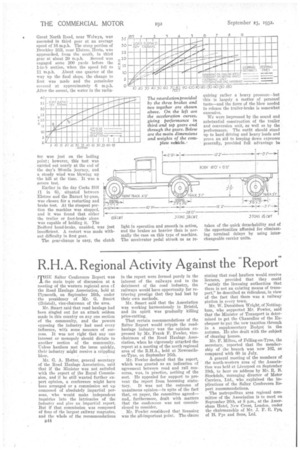R.H.A. Regional Activity Against the "Report"
Page 62

If you've noticed an error in this article please click here to report it so we can fix it.
THE Salter Conference Report was the main topic of discussion at a meeting of the western regional area cf the Road Haulage Association, held at Plymouth, on September 16th, under the presidency of Mr. G. Smart (Bristol), vice-chairman of the area.
Mr. Smart said that road haulage had been singled out for an attack seldom made in this country on any one section of the community, and the powers opposing the industry had used every influence, with some measure of success. It was not right that any one interest or monopoly should dictate to another section of the community. 'finless hauliers met the issue quickly, their industry might receive a crippling blow.
Mr. G. A. Hotter, general secretary of the Road Haulage Association, said that if the Minister was not satisfied with the report of the Royal Commission, and if he still wanted further expert opinion, a conference might have been arranged or a commission set up composed of absolutely impartial persons, who would make independent inquiries into the intricacies of the industry and give an impartial report But if that commission was composed of four of the largest railway magnates, and the whole of the recommendations
1144
in the report were formed purely in the interest of the railways and to the detriment of the road industry, the railways would have opportunity for retrieving prestige that they had lost by their own methods.
Mr. Smart said that the Association was working harmoniously in Bristol, and its spirit was gradually killing price-cutting.
That certain recommendations of the Salter Report would cripple the roadhaulage industry was the opinion expressed by Mr. Frank F. Fowler, vicechairman of the Road Haulage Association, when he vigorously attacked the report at a meeting of the north regional area of the R.H.A. held at Newcastleon-Tyne, on Septeniber 16th.
Mr. Fowler declared that the report, which was greeted as an indication cf agreement between road and rail concerns, was, in practice, nothing of the sort. He appealed for support to prevent the report from becoming statu tory. It was not the outcome of unanimous opinion—in spite of the fact that, on paper, the committee agreed— and,, furthermore, dealt with matters that the conference was not commissioned to consider.
Mr. Fowler considered that licensing was the all-important point. The clause stating that road hauliers would receive licences, provided that they could "satisfy the licensing authorities that there is not an existing means of transport," he described as ridiculous, in view of the fact that there was a railway station in every town.
Mr. W. Donaldson Wright, of Nottingham, who supported Mr. Fowler, said that the Minister of Transport is determined to get the Chancellor of the Exchequer to put the new taxation through in a supplementary Budget in the autumn. He also dealt with the subject of clearing houses.
Mr. F. Milton, of Felling-on-Tyne, the secretary, reported that the membership ofthe branch was now 102, as compared with 60 in July.
A general meeting of the members of the north-western area of the Association was held at Liverpool on September 39th, to hear an address by Mr. R. B. Stockdale, managing director of Motor Carriers. Ltd., who explained the implications of the Salter Conference Report recommendations.
The metropolitan area regional committee of the Association is to meet on September 26th, at 8 p.m., at the Amersham Hotel, New Cross, London, under the chairmanship of Mr. .J. F. E. F'ye, of H. Pye and Sons, Ltd.






































































































